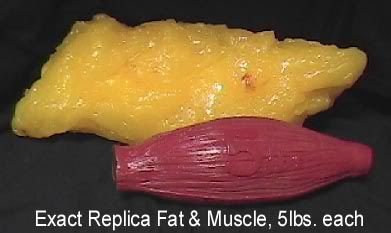Does muscle really weight more than fat?

DESIREE1210
Posts: 177 Member
I started with a personal trainer a few weeks ago. My first week i lost 3-1/2#'s, now this week he has been working me really hard strength training and I show i'm up 2#'s and there's no way I should be up considering my diet and just the sweating alone. It discouraged me. A co-worker said it could be muscle gain but I don't buy it. i'm sticking with it no matter what, maybe i'm just retaining water. I'll be drinking it like a fish the next week.
So my question, is it possible it's muscle gain.????
So my question, is it possible it's muscle gain.????
0
Replies
-
a pound of fat and a pound of muscle both weigh a pound. Weight is weight. However, muscle is leaner. So while a pound of fat and muscle weigh the same, the muscle looks smaller, as it is denser.0
-
a pound of fat and a pound of muscle both weigh a pound. Weight is weight. However, muscle is leaner. So while a pound of fat and muscle weigh the same, the muscle looks smaller, as it is denser.
This0 -
It takes quite a while to gain muscle. But when you do lift weights, your muscles will hold water, but that goes away pretty quickly. It's not all about the exercise. Food is a much bigger factor in losing weight.0
-
this is normal. i put on 2kg after a week of training with my trainer and i went mental then i realised i was actually slimmer, it was just the muscle.
get your trainer to measure you and go by that instead of what the scales say x0 -
a pound of fat and a pound of muscle both weigh a pound. Weight is weight. However, muscle is leaner. So while a pound of fat and muscle weigh the same, the muscle looks smaller, as it is denser.
^This
but i'm sorry to say that you didn't gain two pounds of muscle in a week. A lot of the 3.5lbs the first week was probably water weight. it's not like your body reformed 2 pounds of fat again this past week. I'd guess that your body is working out its water balance. just watch your sodium, keep drinking water, and stick to the plan. you'll lose those two pounds again and even more!0 -
NOO NO NO it is not possible to gain that much muscle that quickly...
It is most likely water retention because when you work out and tear your muscles they retain water to help heal them.
That is all it is. Keep at it. It is soooo good for you, and you will see great results.0 -
It's water retention. Your body needs excess water to repair muscle and to store it along with glycogen in the liver and muscle for the next "anticipated" workout. It's normal and can last up to a couple of weeks till your body adapts.I started with a personal trainer a few weeks ago. My first week i lost 3-1/2#'s, now this week he has been working me really hard strength training and I show i'm up 2#'s and there's no way I should be up considering my diet and just the sweating alone. It discouraged me. A co-worker said it could be muscle gain but I don't buy it. i'm sticking with it no matter what, maybe i'm just retaining water. I'll be drinking it like a fish the next week.
So my question, is it possible it's muscle gain.????
And if you're on calorie deficit, this whole BS of "you're gaining muscle" is really just BS. To gain muscle, you need to have a caloric SURPLUS. It's possible to gain a little muscle if you've never strength trained before, but it would be minute. The best trainers who try to put on muscle are lucky to add 1lb of lean muscle a month even with spot on nutrition.0 -
It takes quite a while to gain muscle. But when you do lift weights, your muscles will hold water, but that goes away pretty quickly. It's not all about the exercise. Food is a much bigger factor in losing weight.
^ This too0 -
not likely in a deficit, and at that rate.0
-
What does a 'clean eater' mean?0
-
It is veryvery hard to gain muscle with in a deficit, secondly 1lb is 1lb, 1lb of fat is actually larger then 1lb of muscle.0
-
I agree with the comments about not gaining muscle weight in 2 weeks. More likely it is water, so do not worry about. Keep drinking water (8+ cups a day), keep working out and stick to your diet plan.
Muscle DOES weigh more than fat because it is denser and leaner. Fat floats, muscle sinks. You will notice this if you ever go in a pool. You will float less as you lose fat.
While I always think weight is an important indicator for many reasons, you will also notice that your clothes feel looser. You need to use both as indicators of progress.
This weight loss thing does not happen overnight. It will take months of consistent effort (depending on how much you have to lose). So stick with it and be patient.0 -
What he said.It's water retention. Your body needs excess water to repair muscle and to store it along with glycogen in the liver and muscle for the next "anticipated" workout. It's normal and can last up to a couple of weeks till your body adapts.
And if you're on calorie deficit, this whole BS of "you're gaining muscle" is really just BS. To gain muscle, you need to have a caloric SURPLUS. It's possible to gain a little muscle if you've never strength trained before, but it would be minute. The best trainers who try to put on muscle are lucky to add 1lb of lean muscle a month even with spot on nutrition.0 -
Muscle DOES weigh more than fat because it is denser and leaner. Fat floats, muscle sinks. You will notice this if you ever go in a pool. You will float less as you lose fat.
A pound is a pound.
Muscle is more dense, it'll take up less 'space' than a pound of fat, but it still weighs the same.0 -
One pound of anything will weigh a pound. BUT, one pound of muscle takes up less space (i.e. is more dense) than one pound of fat. A certain *volume* of muscle does weigh more than the same *volume* of fat.
If you keep at it, you should see inches lost, and eventually the pounds coming off, too. But weight can fluctuate so much throughout the day, due to so many things...water retention, food/beverage consumption, time of day, bowel/bladder elimination. Following a downward trend over time, and following inches lost, is much less frustrating than following the day-to-day fluctuations (which can be a few pounds).0 -
Muscle DOES weigh more than fat because it is denser and leaner. Fat floats, muscle sinks. You will notice this if you ever go in a pool. You will float less as you lose fat.
A pound is a pound.
Muscle is more dense, it'll take up less 'space' than a pound of fat, but it still weighs the same.
Right. So everything weighs the same. Using this logic, lead and feathers weigh the same because a pound of feathers weighs the same as a pound of lead.0 -
No. A pound of muscle weighs the same as a pound of fat. Muscle is just denser.0
-
WIth regard to the eternal "can you build muscle whilst on a calorie deficit" question the answer is yes, but only in specific circumstances.
In the Wallace study (Wallace, M.B., Mills, B.D., & Browning, C.L. (1997). Effects of cross training on markers of insulin resistance/hyperinsulinemia) a group of 8 men lost an average of 16.3 lbs of fat whilst gaining 9.5 lbs of lean mass under clinical observation over a 14 week period.
However, it should be noted that these men were borderline obese with BF% of around 27 and new to training. Also, the figures cited were an average: some lost more and some less due to genetic factors. In addition, whether this rate of fat loss and lean mass gain would carry on at such a rate once their bodies had adapted to the training is highly dubious.
Other circumstances include where an individual can lose fat whilst gaining lean mass are formerly athletic individuals coming back to training after a layoff. However, their figure will be nothing like the above.
If you don't fall into the above categories then it is highly unlikely you can gain lean mass at the same time losing fat whilst on a calorie deficit.
Like the vast majority of questions in fitness this one is individual specific.
ETA: in the Wallace study the water displacement method was used to calculate changes in lean mass (thank you Archimedes...) This is subject to error but better than most methods.0 -
This content has been removed.
-
On MFP? Never. Reminds me, I think I saw a topic about eating your exercise calories...haven't heard about that yet, I need to check it out...I feel like I'm experiencing deja vous.... again.0 -
FYI I have resorted to copy and pasting my same reply when this topic comes up. The answer is yes, muscle weighs more than fat, and here is why.
Weight is a measure of force (so technically it is measured in newtons), specifically the force gravity has on an object. Whereas, mass is a measure of how much matter an object has (measured in mg, g, kg, etc…). Mass is constant, weight is variable (granted I think all of us are on Earth). I think we can agree on all of this, at least I hope so.
Furthermore, in order to compare two objects scientifically, you need to have both a constant and a variable. Saying that 1lb of fat weighs the same as 1lb of muscle is a given because you are only comparing the two constants and ignoring the variable. That is no different than me saying that 100 calories of butter is that same as 100 calories of lettuce, however the quantities of both will differ. So when someone says that muscle weighs more or has more mass than fat it should be assumed that we are not referring to the two obvious constants alone, but are referring to their weights as a variable with respect to a constant volume.
Additionally, when you refer to density you are, by definition, referring to mass and volume simultaneously since density = mass/volume. You cannot know a specific density without knowing both the mass and volume of an object.
So to see how mass volume and density all relate simply think of the following equation and you will never have to question this again.
Weight = (Density x Volume) x Gravity
So how does this formula help? Simple; gravity is constant because we are all on Earth, so if we hold volume constant, and we all agree that muscle is denser than fat, then the outcome is an increased weight.0 -
I dont care if its muscle or fat,because when you are trying to dispose of the evediance its heavy either way:grumble:0
-
I dont care if its muscle or fat,because when you are trying to dispose of the evediance its heavy either way:grumble:
This is an excellent point.0 -
Just water retention so that your muscles can repair themselves....it'll go away. And a pound of muscle and pound of fat both weigh a pound, but a pound of fat is larger (occupies more space) than a pound of fat.
 0
0 -
I dont care if its muscle or fat,because when you are trying to dispose of the evediance its heavy either way:grumble:
My thoughts exactly.0 -
On MFP? Never. Reminds me, I think I saw a topic about eating your exercise calories...haven't heard about that yet, I need to check it out...I feel like I'm experiencing deja vous.... again. 0
0 -
I started with a personal trainer a few weeks ago. My first week i lost 3-1/2#'s, now this week he has been working me really hard strength training and I show i'm up 2#'s and there's no way I should be up considering my diet and just the sweating alone. It discouraged me. A co-worker said it could be muscle gain but I don't buy it. i'm sticking with it no matter what, maybe i'm just retaining water. I'll be drinking it like a fish the next week.
So my question, is it possible it's muscle gain.????
There is a time when you are building muscle and the muscle is coming on to your body faster than you are burning the fat. You can sometimes see an increase in weight during this time, but at the same time, you can see inches coming off of your body because the muscle is more dense. As you gain muscle, it is more effective at burning calories than fat, and you will eventually see the fat burning faster because of your increase in muscle. Everybody's body is different, so the pace this happens for you will be different than for me, your cousin, or someone else on this site.0 -
GOOGLE fat and muscle... There are some great pics to illustrate what fat vs muscle really means....
There is a GREAT photo of a gal who weighs the same in both her before and after shot.
Difference is she is added muscle and lost fat. She created a new shape for her body... which I assume is what we are all after! :-)0 -
So. When all is said and done, is muscle heavier than fat....?0
This discussion has been closed.
Categories
- All Categories
- 1.4M Health, Wellness and Goals
- 398.1K Introduce Yourself
- 44.7K Getting Started
- 261K Health and Weight Loss
- 176.4K Food and Nutrition
- 47.7K Recipes
- 233K Fitness and Exercise
- 462 Sleep, Mindfulness and Overall Wellness
- 6.5K Goal: Maintaining Weight
- 8.7K Goal: Gaining Weight and Body Building
- 153.5K Motivation and Support
- 8.4K Challenges
- 1.4K Debate Club
- 96.5K Chit-Chat
- 2.6K Fun and Games
- 4.8K MyFitnessPal Information
- 12 News and Announcements
- 21 MyFitnessPal Academy
- 1.5K Feature Suggestions and Ideas
- 3.2K MyFitnessPal Tech Support Questions
















